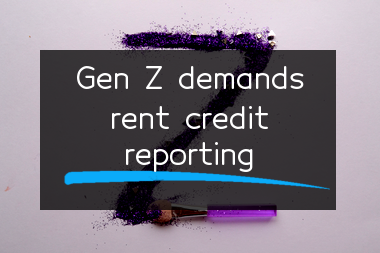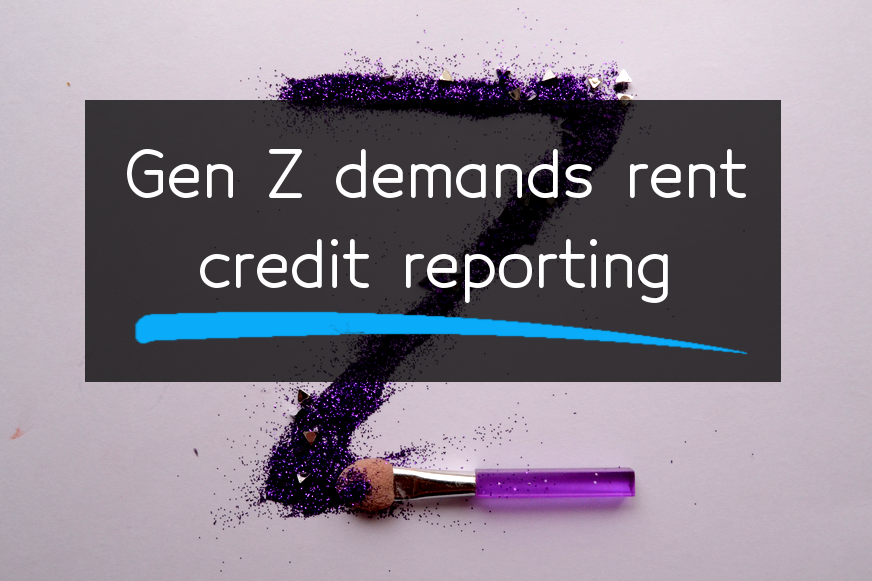Gen Z, which is the generation born between 1997 and 2012, is pushing for landlords to report rent payments to credit bureaus. This means that when a tenant pays their rent on time and in full, it would be recorded and added to their credit report, potentially improving their credit score.
Credit scores are used by lenders to determine a borrower's creditworthiness. A high credit score can mean better interest rates on loans and credit cards, which can save money in the long run. However, previous rent payments are not typically included in credit reports, which can disadvantage tenants who pay their rent on time but struggle to build their credit score.
By pushing for landlords to report rent payments to credit bureaus, Gen Z is advocating for a fairer credit system that considers the full picture of a borrower's financial habits. This change could give tenants more control over their credit score and greater access to financial opportunities.
Survey Shows Gen Z Tenants Want Rent Reported
A survey conducted among Gen Z renters revealed that there is a strong desire among this age group to have their rental payments reported to credit bureaus. The survey, conducted by a leading property management company, involved more than 1,000 Gen Z renters across the United States.
The survey found that 71% of Gen Z renters wanted their rental history to be reported to credit bureaus, with 67% saying that this would help them build their credit scores. The survey also revealed that 58% of Gen Z renters had no credit score or had a credit score below 680, which is considered a low or average score.
One of the main reasons behind this desire for rental payment reporting is the belief that it would help renters establish credit early on in their lives. According to the survey, 85% of Gen Z renters felt that establishing credit early was very important for their financial future.
Additionally, the survey showed that many Gen Z renters feel that their rental history should be considered by lenders and financial institutions when evaluating their creditworthiness. The survey found that 68% of respondents believed that rental payment history should be given the same weight as mortgage payments when evaluating credit.
In summary, the survey shows that a significant portion of Gen Z renters want to have their rental payments reported to credit bureaus and believe that this would help them establish credit early and improve their credit scores. The survey also suggests that lenders and financial institutions should take rental history into account when evaluating creditworthiness.
How to Report Rent Payments to Credit Bureaus
- 1Check if your landlord reports rent payments: Some landlords or property management companies automatically report rent payments to credit bureaus, so it's worth checking with them before taking any action.
- 2Use a rent reporting service: If your landlord doesn't report to credit bureaus, you can sign up for a rent reporting service like RentTrack or Rental Kharma. These services will verify your rent payments with your landlord and report them to credit bureaus on your behalf.
- 3Provide documentation: If you want to report your rent payments on your own, you will need to provide documentation to the credit bureaus. This can include copies of your lease agreement and canceled checks or bank statements showing your rent payments.
- 4Contact credit bureaus: Contact each of the three major credit bureaus (Experian, Equifax, and TransUnion) and inquire how to go about reporting rent payments. They will provide you with any necessary forms and information on how to submit your documentation.
- 5Keep track of your progress: Once you have reported your rent payments, periodically check your credit reports to ensure your payments are accurately reflected. If there are any errors, you can dispute them with the credit bureaus.
Overall, reporting your rent payments can help improve your credit score and demonstrate responsibility to potential lenders.
Does Not Paying Rent Affect Credit Score?
Not paying rent can affect a person's credit score negatively if their landlord sends their account to a collection agency or if they are evicted and a judgment is filed against them. In these situations, the delinquent rent payments can be reported to credit bureaus and appear on a person's credit report, which can result in a lower credit score. Additionally, missed rent payments can also cause a person to default on their lease agreement, potentially making it difficult to rent in the future.
It's important to note that not all landlords report delinquent rent payments to credit bureaus, and missed rent payments alone will not necessarily affect a person's credit score if they are not reported or they are resolved quickly. However, consistently missing rent payments or being evicted can have long-term consequences for a person's financial stability and creditworthiness.
Reasons for Landlords to Report Rent Payments to a Credit Bureau
There are several reasons why landlords may choose to report rent payments to a credit bureau, including:
- 1Establishing credit history: Rent payments can help establish a tenant's credit history, which is important for future financial transactions such as buying a car or obtaining a mortgage.
- 2Encouraging timely payments: Knowing that their rent payments are being reported to a credit bureau may encourage tenants to make timely payments, as missed or late payments can negatively impact their credit score.
- 3Screening potential tenants: Landlords may use credit reports as part of their tenant screening process, and having a record of on-time rent payments can make prospective tenants more attractive.
- 4Reducing rental defaults: By reporting rent payments to a credit bureau, landlords may be able to reduce the risk of rental defaults, as tenants may be more motivated to pay if they know their credit score is on the line.
- 5Increasing property value: By attracting responsible tenants who pay their rent on time, landlords may improve the value of their property and make it more appealing to potential buyers or investors.
Conclusion
Please provide me with more details about what you want me to conclude.
Just one more thing: if you liked the article, please like us on social media and share this article with friends.



